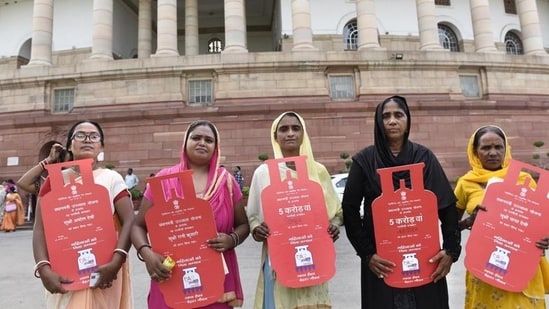Our Terms & Conditions | Our Privacy Policy
Cost-effectiveness analysis of the Pradhan Mantri Ujjwala Yojana (PMUY) in India
Published on: Aug 10, 2025 11:09 pm IST
This paper is authored by Radhika Jha, ORF.
This brief analyses the Pradhan Mantri Ujjwala Yojana (PMUY), launched in 2016 to provide cooking gas to 80 million poor rural households of India. It uses the Well-being Analysis framework to analyse the scheme beyond traditional economic measures and widen the focus to include improvements in people’s overall life. The path-breaking policy initiative was envisioned to reduce dependency on traditional methods of cooking that use polluting fuels like coal and firewood, as well as to mitigate drudgery among women who, because of widely accepted social norms, spend more time in the kitchen. The brief also assesses PMUY’s cost-effectiveness through WELLBY (Wellbeing-Years) calculations, showcasing a potential benchmarking for a well-being-driven planning framework for policymakers.
Beneficiaries under the Pradhan Mantri Ujjwala Yojana at Parliament house, New Delhi, August 3, 2018(Arvind Yadav/HT PHOTO)
The Government of India launched the PMUY, the (Prime Minister’s Flagship Scheme) in 2016 to provide clean cooking fuel to rural households who would otherwise rely on polluting options such as coal and firewood, create ancillary employment, and reduce fossil fuel use. The scheme aimed to give free gas connections to 80 million families by 2020 to improve rural women’s health and promote their empowerment. Before the scheme’s launch, approximately 22% of India’s population (270 million) were living below the poverty line, 80% of them in rural areas, where cooking relied on coal, firewood, and cow dung cakes. At the time of the scheme’s launch, 64% of the population had no access to clean cooking sources, compared to the world average of 38%. Women would walk long distances to collect firewood and spend hours in smoke-filled kitchens, facing health hazards, fire accidents, and a poor quality of life due to the unaffordable cost of gas connections.
Under the programme, the gas connection was issued in the name of an adult woman in the household, ensuring a women-centric and inclusive approach. The scheme was implemented by the ministry of petroleum and natural gas, with oil marketing companies mandated to provide interest-free loans for the purchase of stoves and gas refills after the initial connection. The entire administrative cost was borne by the government, with state-level monitoring to ensure effective implementation. An initial budget of ₹80,000 crore was allocated, and information dissemination camps were organised to raise awareness and train women in the safe handling of stoves and cylinders.
This paper can be accessed here.
This paper is authored by Radhika Jha, ORF.

Images are for reference only.Images and contents gathered automatic from google or 3rd party sources.All rights on the images and contents are with their legal original owners.



Comments are closed.